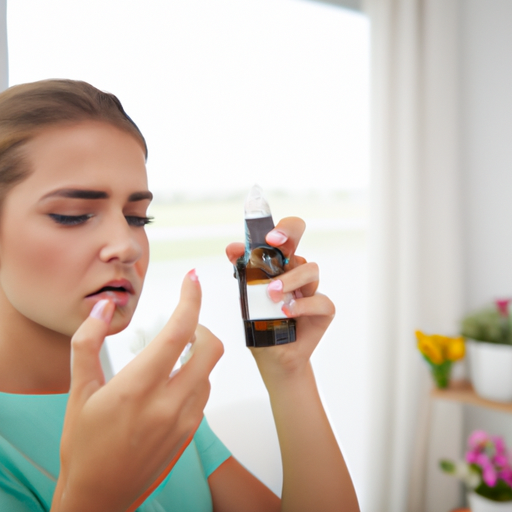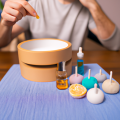-
Table of Contents
- Introduction
- What Are the Health Risks of Inhaling Too Much Essential Oil?
- How Can You Avoid Inhaling Too Much Essential Oil?
- What Are the Symptoms of Inhaling Too Much Essential Oil?
- What Are the Long-Term Effects of Inhaling Too Much Essential Oil?
- What Are the Best Practices for Safely Inhaling Essential Oils?
- How Can You Tell If You’ve Inhaled Too Much Essential Oil?
- What Are the Benefits of Inhaling Essential Oils?
- Q&A
- Conclusion
Introduction
Essential oils are widely used in aromatherapy and other natural remedies, but can inhaling too much essential oil make you sick? Inhaling essential oils can have both positive and negative effects on your health, depending on the type of oil and the amount you inhale. In this article, we will discuss the potential risks of inhaling essential oils, as well as how to safely use them. We will also look at the potential benefits of inhaling essential oils and how to choose the right oil for your needs.
What Are the Health Risks of Inhaling Too Much Essential Oil?
Inhaling too much essential oil can be dangerous and can lead to a variety of health risks. Essential oils are highly concentrated and can cause irritation to the lungs and respiratory system when inhaled in large amounts. Inhaling too much essential oil can cause coughing, wheezing, and difficulty breathing. It can also cause headaches, dizziness, nausea, and vomiting. In extreme cases, it can even lead to coma or death.
Inhaling essential oils can also cause allergic reactions. People with allergies or asthma should be especially careful when using essential oils, as they can trigger an allergic reaction or an asthma attack. Additionally, some essential oils can be toxic if ingested, so it is important to keep them away from children and pets.
Inhaling essential oils can also be dangerous for pregnant women. Some essential oils can cause contractions and can lead to premature labor. It is important for pregnant women to consult their doctor before using essential oils.
In general, it is important to use essential oils with caution and to follow the instructions on the label. It is also important to use essential oils in a well-ventilated area and to avoid inhaling them directly. If you experience any adverse reactions after inhaling essential oils, it is important to seek medical attention immediately.
How Can You Avoid Inhaling Too Much Essential Oil?
Inhaling too much essential oil can be dangerous and can cause adverse reactions. To avoid inhaling too much essential oil, it is important to take the following precautions:
1. Dilute the essential oil with a carrier oil before using it. This will reduce the concentration of the essential oil and make it safer to inhale.
2. Use a diffuser to disperse the essential oil into the air. This will help to reduce the concentration of the essential oil in the air and make it safer to inhale.
3. Do not use essential oils in enclosed spaces. This will increase the concentration of the essential oil in the air and make it more dangerous to inhale.
4. Do not use essential oils in the presence of children or pets. This will reduce the risk of them inhaling too much essential oil.
5. Do not use essential oils for more than 30 minutes at a time. This will reduce the risk of inhaling too much essential oil.
By following these precautions, you can reduce the risk of inhaling too much essential oil and ensure your safety.
What Are the Symptoms of Inhaling Too Much Essential Oil?
Inhaling too much essential oil can cause a variety of symptoms, ranging from mild to severe. The most common symptoms include headaches, dizziness, nausea, vomiting, and difficulty breathing. In some cases, people may experience chest tightness, coughing, and wheezing. In extreme cases, inhaling too much essential oil can lead to anaphylaxis, a life-threatening allergic reaction.
Headaches are the most common symptom of inhaling too much essential oil. This can range from a mild headache to a severe migraine. Dizziness is another common symptom, which can cause lightheadedness and a feeling of unsteadiness. Nausea and vomiting can also occur, as well as difficulty breathing.
Chest tightness and coughing are other symptoms of inhaling too much essential oil. Wheezing is also a common symptom, which is a whistling sound that occurs when breathing. In extreme cases, anaphylaxis can occur, which is a life-threatening allergic reaction. Symptoms of anaphylaxis include difficulty breathing, swelling of the throat and tongue, and a drop in blood pressure.
If you experience any of these symptoms after inhaling essential oil, it is important to seek medical attention immediately.
What Are the Long-Term Effects of Inhaling Too Much Essential Oil?
Inhaling too much essential oil can have long-term effects on the body. Essential oils are highly concentrated and can be toxic if inhaled in large amounts. Long-term exposure to essential oils can cause irritation to the lungs, nose, and throat. It can also lead to headaches, dizziness, nausea, and fatigue. In extreme cases, it can cause respiratory problems, such as asthma, bronchitis, and pneumonia.
In addition, long-term inhalation of essential oils can cause damage to the liver and kidneys. Essential oils contain volatile organic compounds (VOCs) which can be toxic to the body. VOCs can accumulate in the body over time and cause damage to the organs.
Finally, long-term inhalation of essential oils can cause an imbalance in the body’s hormones. Essential oils contain phytochemicals which can disrupt the body’s natural hormone balance. This can lead to a variety of health issues, such as infertility, depression, and anxiety.
It is important to use essential oils in moderation and to avoid inhaling them in large amounts. If you are using essential oils, it is best to use them in a diffuser or to dilute them in a carrier oil before applying them to the skin. It is also important to consult with a healthcare professional before using essential oils.
What Are the Best Practices for Safely Inhaling Essential Oils?
Inhaling essential oils is a popular way to enjoy their therapeutic benefits. However, it is important to practice safe inhalation techniques to avoid any potential risks. Here are some best practices for safely inhaling essential oils:
1. Dilute the oil: Essential oils are highly concentrated and should be diluted before inhalation. Mix a few drops of essential oil with a carrier oil, such as coconut or jojoba oil, and then inhale the mixture.
2. Use a diffuser: A diffuser is a device that disperses essential oils into the air. This is a great way to enjoy the benefits of essential oils without having to directly inhale them.
3. Avoid direct inhalation: Direct inhalation of essential oils can be irritating to the lungs and can cause respiratory issues. Instead, try using a tissue or cotton ball to inhale the oil.
4. Start slow: When inhaling essential oils, start with a small amount and gradually increase the amount as needed.
5. Avoid prolonged inhalation: Prolonged inhalation of essential oils can be dangerous. Limit your inhalation time to a few minutes at a time.
By following these best practices, you can safely enjoy the therapeutic benefits of essential oils.
How Can You Tell If You’ve Inhaled Too Much Essential Oil?
Inhaling too much essential oil can cause a variety of adverse reactions, ranging from mild to severe. Symptoms of essential oil inhalation toxicity can include headaches, dizziness, nausea, vomiting, difficulty breathing, coughing, chest tightness, and irritation of the eyes, nose, and throat. In extreme cases, essential oil inhalation toxicity can lead to seizures, coma, and even death.
If you experience any of the above symptoms after inhaling essential oils, it is important to seek medical attention immediately. Additionally, it is important to be aware of the potential risks associated with essential oil inhalation and to use caution when using essential oils. It is recommended to use essential oils in a well-ventilated area and to avoid inhaling them directly. It is also important to use only pure, therapeutic-grade essential oils and to follow the manufacturer’s instructions for use.
What Are the Benefits of Inhaling Essential Oils?
Inhaling essential oils is a popular practice that has been used for centuries to promote physical and emotional wellbeing. Essential oils are highly concentrated plant extracts that contain a variety of compounds that can be beneficial when inhaled. The benefits of inhaling essential oils include improved mood, relaxation, improved sleep, and relief from stress and anxiety.
Inhaling essential oils can help to improve mood and reduce stress. The compounds in essential oils can interact with the olfactory system, which is responsible for the sense of smell. When inhaled, these compounds can stimulate the release of hormones such as serotonin and dopamine, which are known to have a calming and uplifting effect on the body and mind.
Inhaling essential oils can also help to promote relaxation and improve sleep. The compounds in essential oils can interact with the limbic system, which is responsible for regulating emotions and controlling the body’s stress response. When inhaled, these compounds can help to reduce stress and anxiety, which can lead to improved sleep quality.
Inhaling essential oils can also help to reduce inflammation and improve respiratory health. The compounds in essential oils can interact with the respiratory system, which can help to reduce inflammation and improve breathing. Inhaling essential oils can also help to reduce the symptoms of allergies and asthma.
In conclusion, inhaling essential oils can provide a variety of benefits, including improved mood, relaxation, improved sleep, and relief from stress and anxiety. Inhaling essential oils can also help to reduce inflammation and improve respiratory health. For these reasons, inhaling essential oils is a popular practice that has been used for centuries to promote physical and emotional wellbeing.
Q&A
1. Can inhaling too much essential oil make you sick?
Yes, inhaling too much essential oil can make you sick. Essential oils are highly concentrated and can cause irritation to the lungs and mucous membranes if inhaled in large amounts.
2. What are the symptoms of inhaling too much essential oil?
The symptoms of inhaling too much essential oil can include coughing, sneezing, headaches, dizziness, nausea, and difficulty breathing.
3. How can I avoid inhaling too much essential oil?
To avoid inhaling too much essential oil, use a diffuser to disperse the oil into the air. This will help to reduce the concentration of the oil in the air and reduce the risk of inhaling too much.
4. Is it safe to use essential oils in a diffuser?
Yes, it is generally safe to use essential oils in a diffuser. However, it is important to follow the instructions provided with the diffuser to ensure that the oil is dispersed safely and not inhaled in large amounts.
5. Are there any risks associated with using essential oils in a diffuser?
Yes, there are some risks associated with using essential oils in a diffuser. These include irritation to the eyes, skin, and lungs, as well as the potential for an allergic reaction.
6. Are there any precautions I should take when using essential oils in a diffuser?
Yes, there are some precautions you should take when using essential oils in a diffuser. These include avoiding using the diffuser in an enclosed space, avoiding using the diffuser for more than 30 minutes at a time, and avoiding using the diffuser near children or pets.
7. Are there any other ways to use essential oils safely?
Yes, there are other ways to use essential oils safely. These include applying them topically, using them in a bath, or using them in a massage oil. It is important to always dilute essential oils before using them on the skin.
Conclusion
In conclusion, inhaling too much essential oil can make you sick. Essential oils are highly concentrated and can cause irritation to the lungs and respiratory system when inhaled in large amounts. It is important to use essential oils safely and in moderation to avoid any potential health risks.




